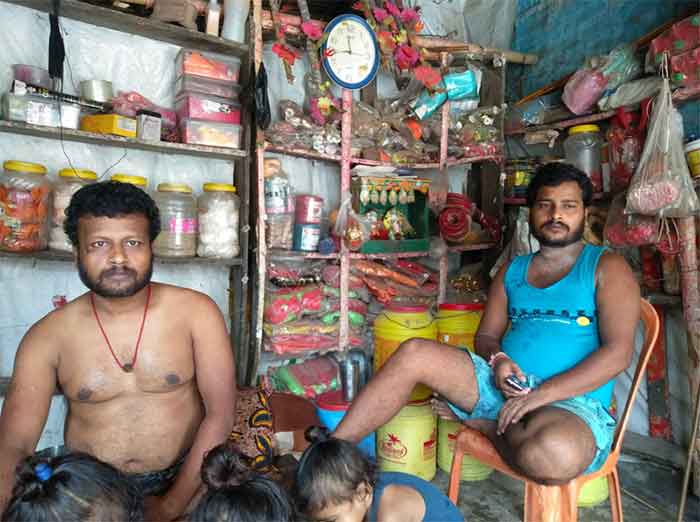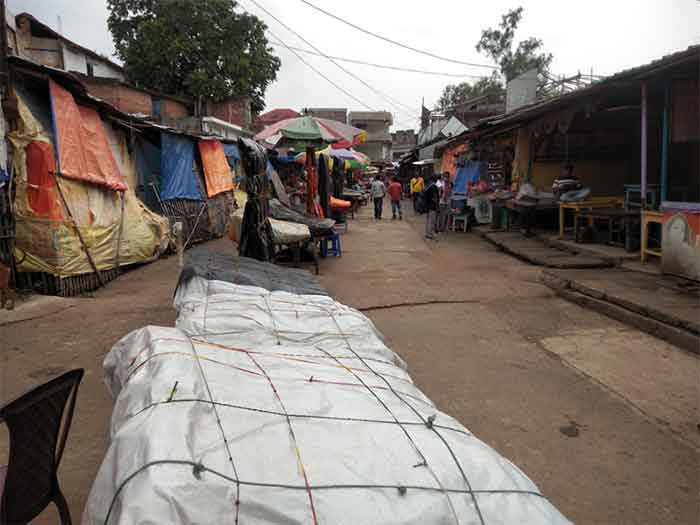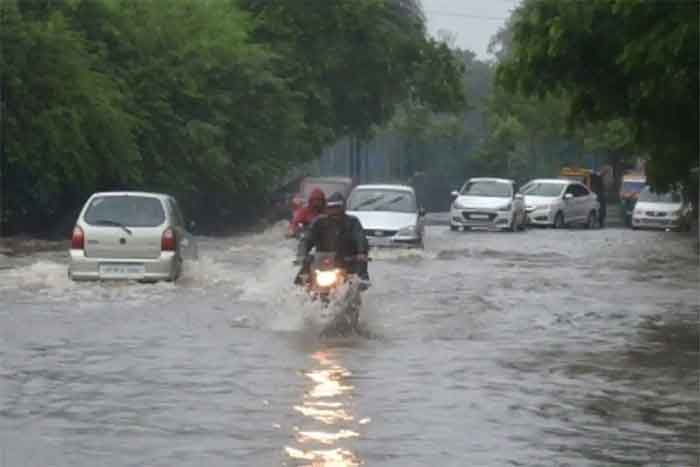Locals estimate that the employment of almost 50,000 people has been affected in Jharkhand’s Deoghar area alone, owing to cancellations of the Kanwar Yatra and Shravani Mela amidst COVID-19.

Bihar: 35-year-old Amit Kumar Saha and his brother Rohit Kumar run a pooja shop in Sultanganj town in Bihar’s Bhagalpur district. The family, which lives right behind the shop, has been in the business for generations, making a living by selling items like saffron-coloured clothes, containers of different sizes to carry the holy water from the Ganges, decorated sticks to hang the vessels, rudraksh malas, and other objects needed by the pilgrims along the route. But now they face an uncertain future.
 The Kanwar yatra is an annual pilgrimage made by Shiva devotees, usually held in the monsoon months of July-August, coinciding with the Badho month of the Hindu calendar. The devotees travel to places of pilgrimage such as Haridwar in Uttarakhand and Sultanganj in Bihar to fetch holy water from the Ganga river. From Sultanganj, the saffron-clad devotees carry the sacred water to Baba Baidyanath Dham in Deoghar, Jharkhand, where the Shravani Mela is held. Last year, the government had restricted the Kanwar Yatra and the Shravani Mela owing to COVID-19. They remain cancelled this year as well.
The Kanwar yatra is an annual pilgrimage made by Shiva devotees, usually held in the monsoon months of July-August, coinciding with the Badho month of the Hindu calendar. The devotees travel to places of pilgrimage such as Haridwar in Uttarakhand and Sultanganj in Bihar to fetch holy water from the Ganga river. From Sultanganj, the saffron-clad devotees carry the sacred water to Baba Baidyanath Dham in Deoghar, Jharkhand, where the Shravani Mela is held. Last year, the government had restricted the Kanwar Yatra and the Shravani Mela owing to COVID-19. They remain cancelled this year as well.
Due to the Yatra’s cancellation, the Saha family’s financial condition has deteriorated over the last two years. This dire situation has forced Saha to adopt an alternative source of income, i.e. making confectionery and food for events and parties. Talking about his family, Saha said that with the earnings of the pooja shop, they were able to marry off five of his sisters. However, now even running the household has become difficult. “What must we do in this situation?” he questioned, expressing his displeasure with the fact that across the country work is carrying on as usual but the pandemic seemed to pose a danger for the Shravani fair alone.
The 108 km long Kanwar Yatra from Sultanganj to Deoghar and its 38 km extension from Deoghar to Basukinath Dham in Dumka district creates lakhs of temporary jobs in the several villages it passes through in the Bhagalpur, Munger, Banka, Deoghar and Dumka districts.

There are around 500 permanent shops in Basukinath and 2000 temporary ones. These are usually set up by people from rural Bihar and Jharkhand during the Shravani Mela. Deepak Kumar and Sonu Kumar Sao, who run a shop next to the temple in Basukinath, said that ‘temporary shops have not opened for the last two years. Those with permanent shops have also suffered.’
The households of thousands of people run for a year on the earnings of these two months. Many people in this region also take loans based on their potential gains in the Kanwar Yatra.
Vinod Das, a 75-year-old man from Khijuria village in the Deoghar district, has been running a hotel for three decades with his two sons and other family members. However, for the last two years, his hotel has remained shut and is dilapidating without repairs.
“We haven’t been able to repay our loans due to the fair being cancelled the last two years,” rued Das, who has neither agricultural land nor any other means of employment. Das was supposed to undergo a prostate operation but has had to postpone it due to the loss of income. His sons are currently working as labourers. His wife Kalmi Devi said, “Corona has caused a lot of damage to us.”
Living on false hope
Last year, after the first COVID-19 wave brought on a major dip in the economy, Finance Minister, Nirmala Sitharaman had announced an economic relief package of Rs 20 lakh crore. One of the directions under it mentioned providing loans worth Rs 10,000 each for street vendors and small shopkeepers. Saha said that he had filled the form for this loan. However, he is yet to receive any acknowledgement, let alone the money.
Saha’s fate is similar to that of Sunil Kesari, who lives over a hundred kms away from him in Deoghar. The 23-year-old opened a bangle shop, near Baba Baidyanath Jyotirlinga temple, only three years ago. However, COVID-19 lockdowns and the fair cancellations for two consecutive years has affected his business.
Sanjeev Kumar Singh and his wife Sunita Devi run an eatery on the Kanwariya path in Teghra village in Tarapur block of Bihar’s Munger district. They said that some officers from the administration had come to take stock of the area. “They told us to prepare for the fair, as it would happen. We were excited about it,” they said. But now that it’s clear that the festivities won’t happen, they have to figure out how to face the situation.
The UP government was keen to allow the yatra to happen this year and it was scheduled to start on July 25. Chief Minister Yogi Adityanath even convened a meeting on July 9 to discuss security and safety arrangements for the yatra, keeping in mind COVID-19 protocols. But the Supreme Court, having taken suo motu cognisance of the matter, came down heavily against the yatra, giving the government until July 19 to call it off.
Mounting losses
While there are no official figures to determine the loss to the economy due to the cancellations of Kanwar Yatra, locals make a rough estimate based on the number of Kanwariyas or pilgrims and the money they spend on food and other necessities etc.
Sanjeev Jha, the chief priest or the ‘panda‘ of Sultanganj and the President of Janhvi Kshetra Panda Kalyan Mahasabha, said that there had been losses worth almost Rs 1000 crores this year alone along the 150 km-route due to the cancellation of Shravani Mela. This is based on the estimates that between 1-2 lakh pilgrims pass through each day, travelling on foot for 3-4 days to complete the journey.
Kartiknath Thakur, secretary of Panda Dharmarakshini Sabha of Baba Baidyanath Jyotirlinga said that this fair is expanding from Sultanganj-Deoghar-Basukinath to Tarapith in West Bengal because 10 to 15 percent of the devotees have even started going there for darshan. ‘The economy of our region is temple-based. If the devotees don’t come, the people’s problems will increase,’ he added.
Thakur estimates that the cancellation of the fair is affecting the employment of 50,000 people in Deoghar and its surrounding areas. This figure excludes those in the 146 km long road stretch between Sultanganj and Basukinath.
He has made suggestions to the government to only allow those who have taken both doses of the COVID-19 vaccine to enter the temple, in limited numbers with social distancing measures, so that people’s income, including those of five thousand panda-purohits in the region, does not suffer.
Thakur’s suggestions are echoed by Manoj Panda, president of Panda Dharmarakshini Sabha based in Basukinath. “People have reached the verge of starvation due to the fair’s cancellation,” he said, adding that “if the temple is closed here, that means that everything is shut.”
Rahul Singh is a Devghar-based freelance journalist and a member of 101Reporters.com, a pan-India network of grassroots reporters.












































